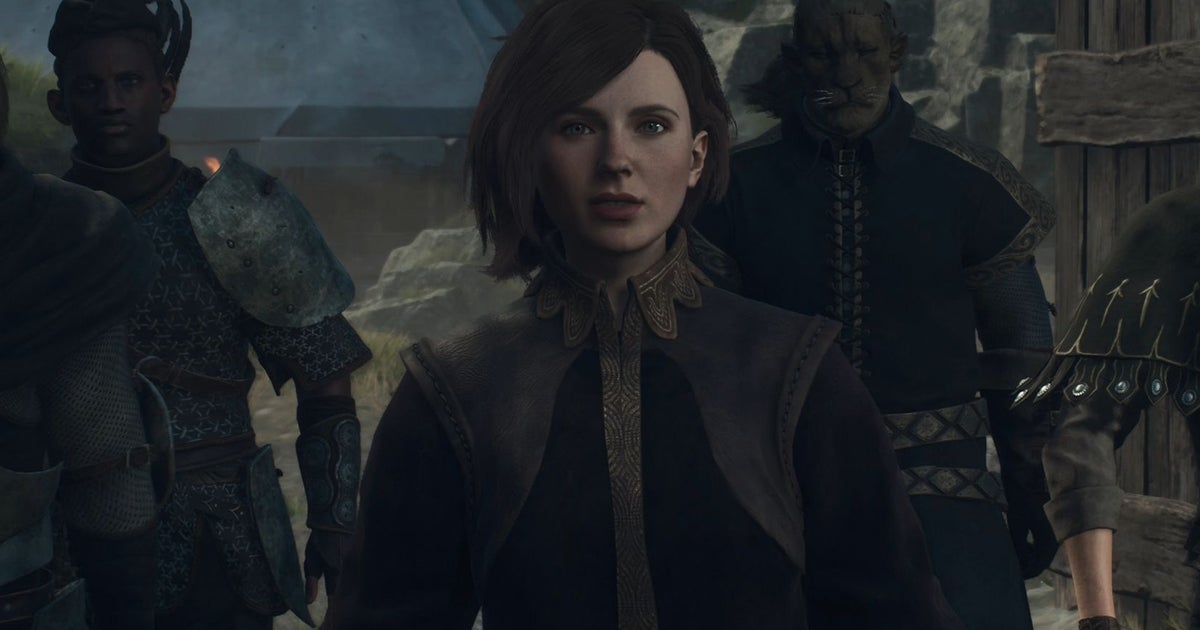Pawns are the NPCs who will accompany you on your adventure in Dragon’s Dogma 2 – be them your Main Pawn or a Support Pawn created by another player.
Being your constant companions, Pawns play an essential part in Dragon’s Dogma 2 – from fighting alongside you to gathering items to even retelling pieces of local gossip. (Pawns are quite talkative to say the least.) For this reason, it’s a good idea to learn everything you can about Pawns.
To help you accomplish this, we’ve put together this overview of Pawns in Dragon’s Dogma 2. Read on to learn how to hire Pawns, Pawn Specialisations, Pawn Badges and a little bit about Dragonsplague – the illness only Pawns can catch.
On this page:
Pawns in Dragon’s Dogma 2 explained
Pawns are NPC characters who will accompany you on your adventure in Dragon’s Dogma 2. There are two types of Pawn: your Main Pawn and Support Pawns. Including your Main Pawn, you can travel with a maximum of three Pawns at a time and they essentially act as your party – battling alongside you, carrying their own inventory, having their own set of skills and talking. Pawns talk a lot. (I know the ladder is there – you mention it every time we walk down this street!)
Pawns are an essential part of Dragon’s Dogma 2’s gameplay because, along with being incredibly helpful in combat, they also provide a variety of other skills. This can include guiding you to quest locations if they have the Quest Guide option, gathering items or having specialisations, such as being able to translate elvish.
Pawns can be one of six Vocations – Fighter, Mage, Archer, Thief, Warrior and Sorcerer. They also have an Inclination, which we go into more detail further along in this guide, which helps decide how they will act. You may find that one of your Pawns will also come with or gain a Badge when travelling with you, which can help increase their usefulness. Again, we touch upon this in more detail further along in the guide.
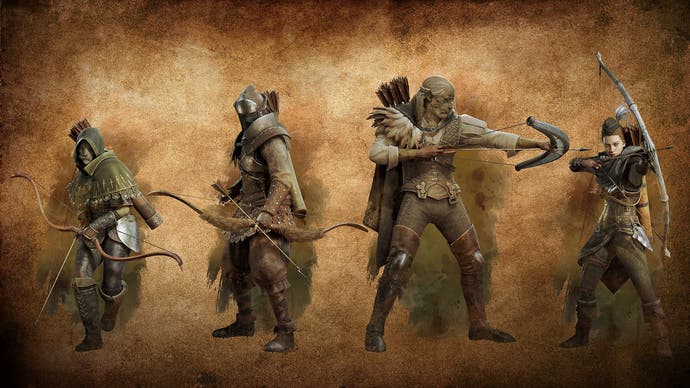
Pawn’s can also be sent on Pawn Quests. This is when they’re hired by another player and travel alongside them. You have the ability to set both the quest and reward the player will receive for completing it. If you want to learn more about Pawn Quests, take a look further along in this guide.
One important thing to remember about Pawns is only your Main Pawn can level up. Due to this, you’ll often find yourself switching out your other two Pawns as your adventure continues.
This isn’t the only difference between your Main Pawn and Support Pawns though…
Main Pawn differences in Dragon’s Dogma 2 explained
Your Main Pawn works a little differently compared to the other Pawn’s in Dragon’s Dogma 2 as they’ll be your constant companion during the adventure.
Unlike other Pawns, you have the ability to create your Main Pawns, changing their appearance using the Character Creator, along with choosing their Inclination, Vocation, Weapon Skills, Core Skills and Augments. You can even change their Vocation if you so choose.
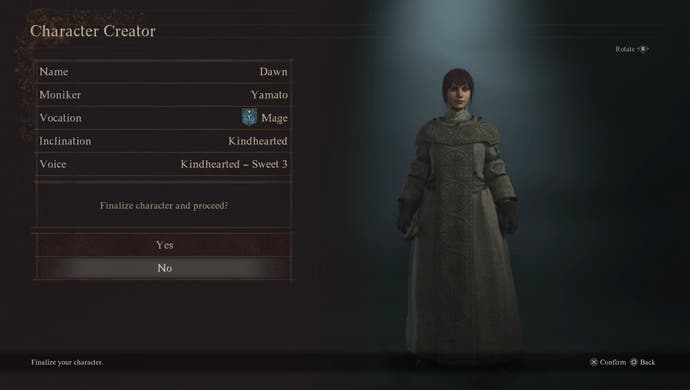
The most important thing to remember, however, is that your Main Pawn is the only Pawn which can level up. They’ll gather XP alongside you, becoming more powerful and increasing their Vocation Rank too. For this reason, it’s worth treating your Main Pawn as an extra build alongside the Arisen – ensuring it’s perfect so you can be victorious.
We have a guide covering the best early game Pawn builds if you’d like some helping deciding how to start crafting your Main Pawn.
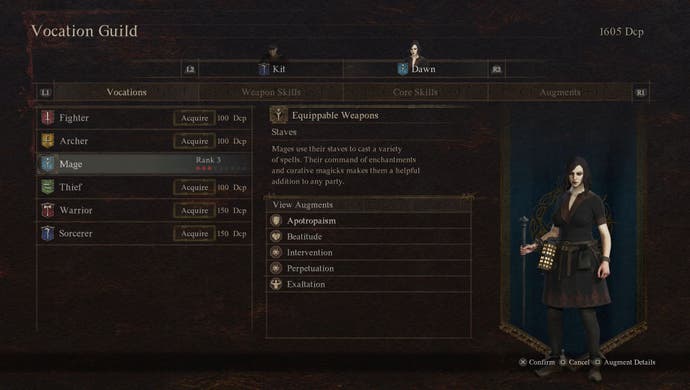
How to hire Pawns in Dragon’s Dogma 2
There are two ways you can hire Pawns in Dragon’s 2. The first sees you using one of the many Rift Stones dotted about the map, while the second is by hiring one of the Pawns you encounter on your journey.
While using a Rift Stone will offer a greater selection of Pawns, allowing you to search for exactly the kind of Pawn you’re looking for, hiring a Pawn you might in the wild adds an element of spontaneity to your playthrough. It can also come in quite handy if one of your Pawns is at lower level to the rest of your party or if the Pawn you encounter has a Vocation which might help with an upcoming quest.
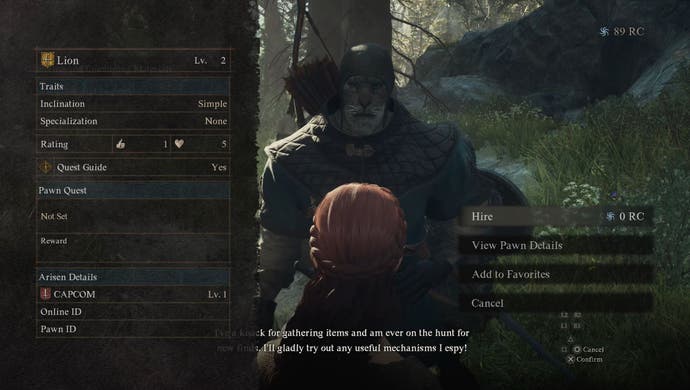
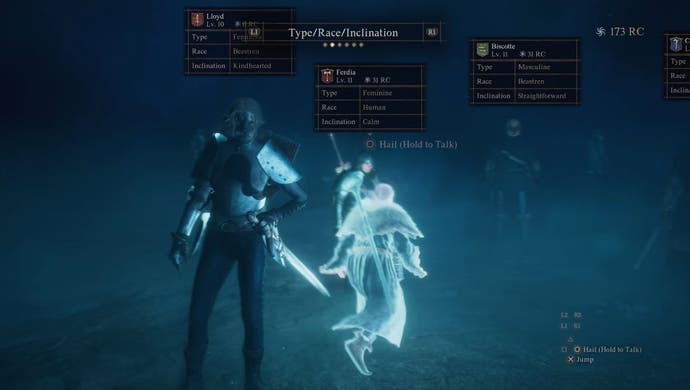
Either way, to hire a Pawn you need to have Rift Crystals, more commonly referred to as RC, and we have a guide covering how to get RC if you want to learn more.
Two important things to keep in mind is that hiring Pawns at a higher level to you will cost more RC and that it’s a good idea to swap out your Pawns regularly. This is because, as mentioned above, only the Main Pawn levels up, so keeping the same Pawn’s forever will put you at risk.
When you dismiss a Pawn, you’ll have the chance to give them a rating and a gift. If this Pawn belonged to another player then they will receive this gift. Any item a Pawn is holding when they’re dismissed or die will be sent to your Item Storage.
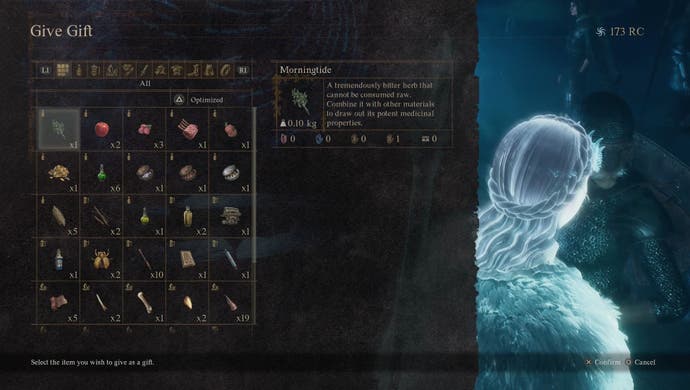
Pawn Inclinations in Dragon’s Dogma 2 explained
There are four Pawn Inclinations which help decide how a Pawn will act both in battle and outside of it in Dragon’s Dogma 2. Certain Vocations work better with certain Inclinations, so it’s a good idea to take it into account when picking your Support Pawns. You may also want a Pawn to help with a certain task, such as gathering materials on your travel, so having the right Inclination can come in handy.
It’s important to note that you can only pick the Inclination of your Main Pawn, so it’s a good idea to know the best Inclination for each Vocation. Pawns are always loyal to the Arisen though, so you don’t need to worry about taking betrayal into account.
Here’s a quick rundown of each Inclination and how it will make a Pawn act:
- Kindhearted – Focus on support, holding down enemies and using beneficial enchantments in combat. Remain by the Arisen’s side outside of combat.
- Calm – Focus on survival and defence while evading enemies in battle. Outside of battle, they will remove unneeded items from their inventory without being asked to.
- Simple – Focus on gathering items and noticing important features, such as the site of a Rift Stone, in the area you’re currently exploring. May also give the items they find.
- Straightforward – Able to spot enemies from afar, can start combat and may also focus on large enemies.
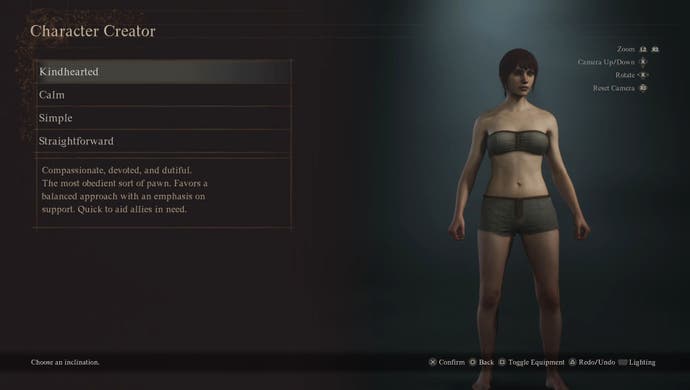
Pawn Commands in Dragon’s Dogma 2 explained: What do the Pawn commands do?
There are four Pawn Commands you can give while exploring in Dragon’s Dogma 2 – Go, To Me, Wait and Help.
Go causes the Pawn to act independently to you. In combat this means they’ll spread out across the battlefield, while, when exploring, they’ll interact with objects like chests or material as they follow you. If a Pawn makes a suggestion, such as finding a Rift Stone, using Go will cause them to follow through with this idea or help you in completing a task.
To Me causes Pawns to approach you. In this combat, this will cause them to fight by your side.
Wait will cause Pawns to stop moving and await for your next command where they stand. If used in battle, this will cause Pawns to stop fighting and instead another way to assist you.
Help causes Pawns to focus on healing, recovery and other support roles.
It’s important to pay attention to which Pawn Command you use as the right Command at the right time can turn a battle in your favour or have a far more deadlier outcome… You can find the controls for the Pawn Commands in the bottom left-hand corner of your screen.
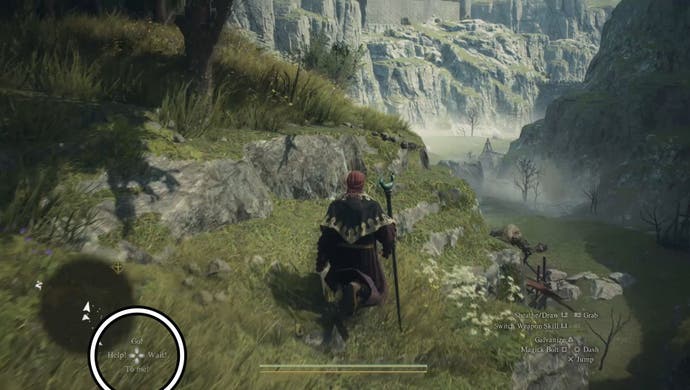
Pawn Specialisation in Dragon’s Dogma 2 explained
Specialisations are skills which can only be learned by Pawns, such as being able to translate elvish, in Dragon’s Dogma 2. They essentially act as an additional skill for your Pawn. You may find that having a Pawn with a particular Specialisation will come in handy with a certain quest or come in handy during combat. Though not every Specialisation may seem useful on the surface…
A Pawn can only know one Specialisation at a time. If you want them to learn a new one, said new Specialisation will replace the old one, so always make sure you’re happy with your decision before doing so.
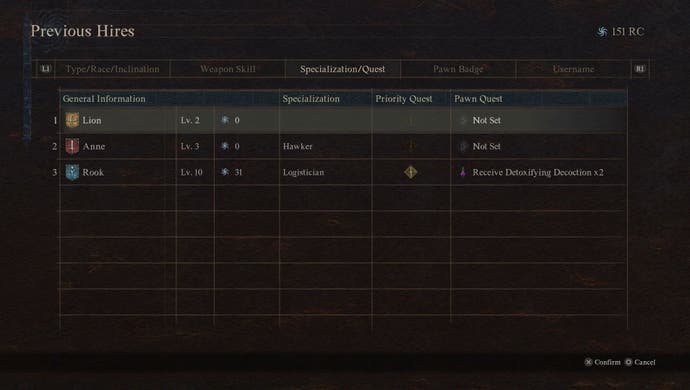
Pawn’s can learn Specialisation by the use of tomes, such as the Chirurgeon Tome, or by you growing close to a specific NPC. You may find that a Pawn will learn a Specialisation focused around surviving in a certain location, assist when combining items or gain a tome, again like Chirurgeon, which will cause them to focus on healing others.
It’s always a good idea to check whether a Pawn has a Specialisation when hiring!
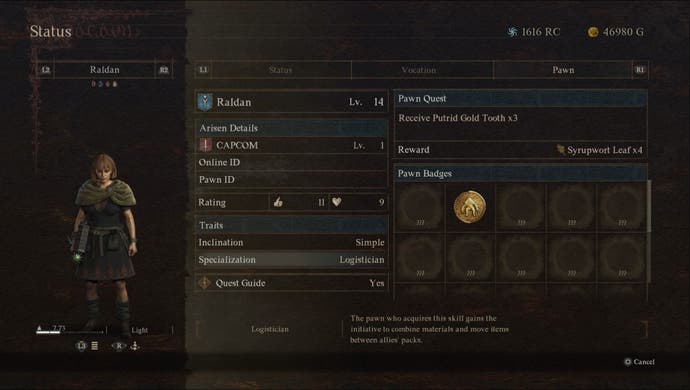
Pawn Badges in Dragon’s Dogma 2 explained
Pawn Badges are earned after a Pawn achieves a specific feat in Dragon’s Dogma 2 and there are two types – Monster Badges and Field Badges.
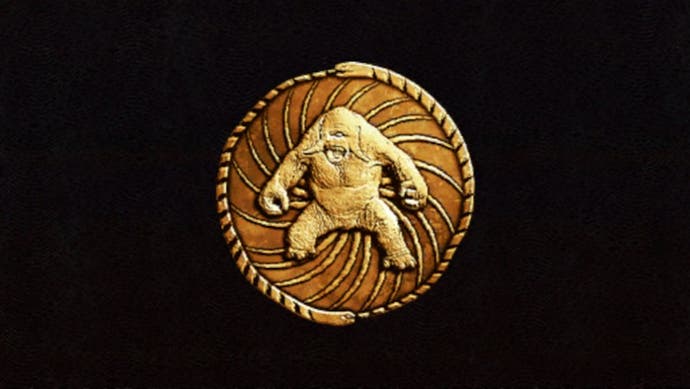
Monster Badges focus, unsurprisingly, on defeating monsters and are awarded after a Pawn defeats the monster its focused around a specific number of times. After earning the badge, you’ll be able to benefit from their increased ability against said foe.
Pawn’s gain Field Badges the more you camp in a specific region. Spend a lot of time camping in Vernworth? Then you’re going to end up gaining progress for that region’s field badge. Once a Field Badge requirement has been met your Pawn will be able to offer useful advice on the region as you explore it.
You can check on your Pawn’s Badge progress by visiting the ‘Status’ option in the main in-game menu, selecting a Pawn and scrolling to the ‘Pawn’ option. There you’ll be able to find a list of all the Pawn Badges they’ve unlocked and are making progress on.
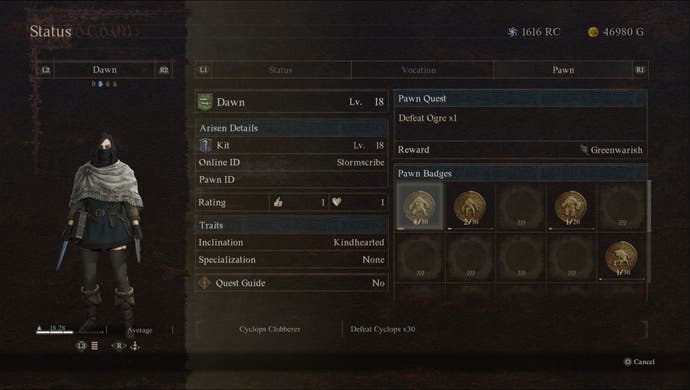
Pawn Quests and Travelogue in Dragon’s Dogma 2 explained
Pawn Quests are missions you can give to your Main Pawn to accomplish when they’re journeying with other players playing Dragon’s Dogma 2. You may also find that one of your Support Pawns will have had a quest set by their creator, which you can complete for a reward. A Pawn Quest can range from defeating a specific type of monster, like an ogre, to simply travelling with that player for a day.
You get to pick the exact Pawn Quest your Main Pawn needs to undertake, while also setting a reward – either in the form of an item or gold – to encourage the other player to complete it. If you choose an item, it will vanish from your inventory, while gold will come from your own funds. It’s a good idea to ensure the reward matches the quest’s difficulty or else no-one will complete it.
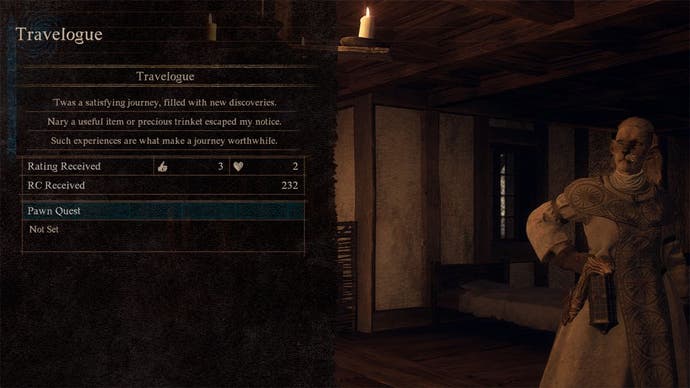
Undertaking Pawn Quest’s can help you Main Pawn gain progress on Pawn Badges too. This will make them more useful in your journey, while also encouraging other players to hire them.
To learn about your Main Pawn’s adventure beyond the rift, you need to stay at an inn or sleep in your house. When you awake, you’ll be shown your Main Pawn’s Travelogue which will detail how they’re journey went, any play ratings your Pawn earned, any RC they collected and the progress they made with their Pawn quest. You may even receive some items other players have given them as gifts.
You can find information about a Pawn’s Quest, along with setting your Main Pawn’s quest, in the ‘Pawn’ section of the ‘Status’ menu.
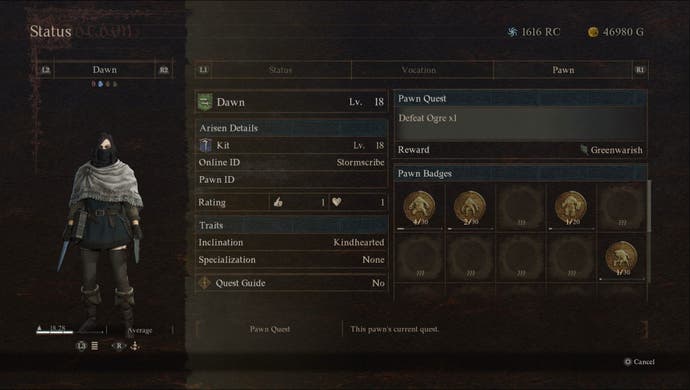
There is another ‘gift’ a Pawn can bring back from beyond the rift though…
Dragonsplague in Dragon’s Dogma 2 explained
Dragonsplague is an illness that can only affect Pawns in Dragon’s Dogma 2 and, outside of the first time you encounter a Pawn with it, you might not even know they have it. The signs you need to look out for are glowing red eyes, the Pawn disobeying commands, gaining new skills without your intervention and, if left untreated, murdering other NPCs while you rest at an inn. (Thankfully these people can be saved by using a Wakestone.)
Dragonsplague is also contagious so, once one of your Pawns has it, the disease can quickly spread to the rest of your party. This means your Main Pawn can also contract it when travelling with another player if it’s infected one of their party. Pawn’s can also get Dragonsplague by being grappled by a drake or you may hire a Pawn from the rift with the disease. You won’t know they have it when you do, so always be on the lookout for the symptoms.

To cure Dragonsplague in your Main Pawn, they need to die and then resummon them from a Riftstone. This can be done by either not healing the Pawn or putting them into a situation of certain death, like tossing them off a cliff. So yeah – got to murder your Main Pawn to cure Dragonsplague. There’s no way to cure Dragonsplague in a Support Pawn – you simply need to dismiss them and hope their player creator cures the disease.
Thankfully, the Arisen is safe from Dragonsplague.
Our other Pawn related guides for Dragon’s Dogma 2
Here are all of the Pawn-related guides we’ve written for Dragon’s Dogma 2 so far:
Good luck working alongside your Pawns in Dragon’s Dogma 2!

